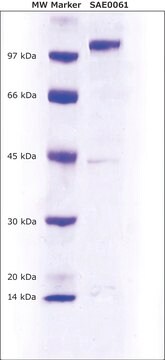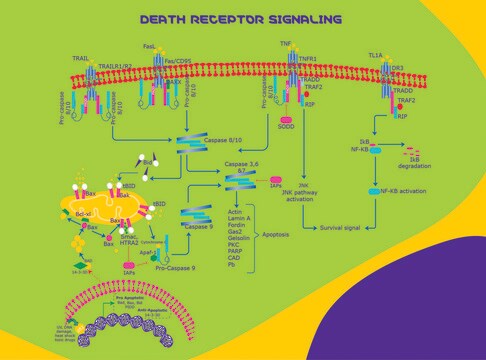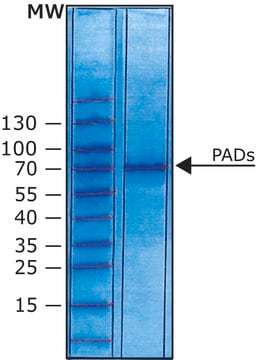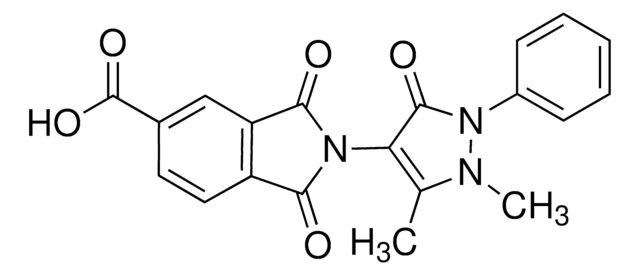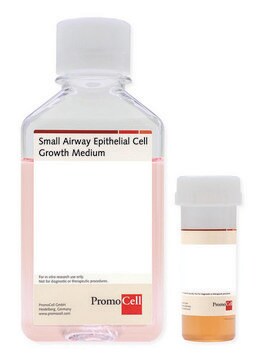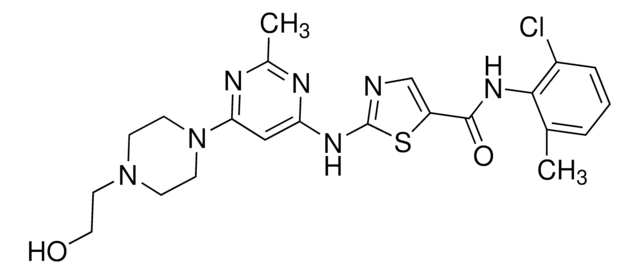Wszystkie zdjęcia(1)
Kluczowe dokumenty
SRP5223
PAD1, GST tagged human
recombinant, expressed in baculovirus infected Sf9 cells, ≥70% (SDS-PAGE), buffered aqueous glycerol solution
Synonim(y):
HPAD10, PADI1, PDI, PDI1
Zaloguj sięWyświetlanie cen organizacyjnych i kontraktowych
About This Item
Kod UNSPSC:
12352200
NACRES:
NA.32
Polecane produkty
pochodzenie biologiczne
human
rekombinowane
expressed in baculovirus infected Sf9 cells
Próba
≥70% (SDS-PAGE)
Postać
buffered aqueous glycerol solution
masa cząsteczkowa
~95 kDa
numer dostępu NCBI
Zastosowanie
cell analysis
Warunki transportu
dry ice
temp. przechowywania
−70°C
informacje o genach
human ... PADI1(29943)
Opis ogólny
Peptidyl arginine deiminase 1 (PAD1) is a member of the peptidyl arginine deiminase family of enzymes. It is a component of the 26S proteasome, a multiprotein complex that degrades proteins targeted for destruction by the ubiquitin pathway. PAD1 is expressed in the epidermis and uterus. The gene encoding this protein is localized on human chromosome 1p36.13.
Działania biochem./fizjol.
Peptidyl arginine deiminases catalyze the post-translational deimination of proteins by converting arginine residues into citrullines in the presence of calcium ions. The overexpression of PAD1 induced a distinctive pattern of multidrug resistance in mammalian cells and moderate resistance to ultraviolet light. PAD1 is also responsible for substrate deubiquitination during proteasomal degradation. It deiminates filaggrin in the last stages of keratinocyte differentiation. Thus, PAD1 has a role in epidermis function and homeostasis. The protein has been genetically associated with rheumatoid arthritis.
Postać fizyczna
Supplied in 50mM Tris-HCl, pH 7.5, 150mM NaCl, 10mM glutathione, 0.1mM EDTA, 0.25mM DTT, 0.1mM PMSF, 25% glycerol.
Uwaga dotycząca przygotowania
after opening, aliquot into smaller quantities and store at -70 °C. Avoid repeating handling and multiple freeze/thaw cycles
Komentarz do analizy
This protein is not assayed for enzymatic activity.
Ta strona może zawierać tekst przetłumaczony maszynowo.
Kod klasy składowania
10 - Combustible liquids
Klasa zagrożenia wodnego (WGK)
WGK 1
Temperatura zapłonu (°F)
Not applicable
Temperatura zapłonu (°C)
Not applicable
Certyfikaty analizy (CoA)
Poszukaj Certyfikaty analizy (CoA), wpisując numer partii/serii produktów. Numery serii i partii można znaleźć na etykiecie produktu po słowach „seria” lub „partia”.
Masz już ten produkt?
Dokumenty związane z niedawno zakupionymi produktami zostały zamieszczone w Bibliotece dokumentów.
Citrullination of CXCL8 by peptidylarginine deiminase alters receptor usage, prevents proteolysis, and dampens tissue inflammation.
Proost P
The Journal of Experimental Medicine (2008)
Potential Role of Peptidylarginine Deiminase Enzymes and Protein Citrullination in Cancer Pathogenesis
Sunish Mohanan, et.la
Biochemistry Research International (2012)
The peptidylarginine deiminases expressed in human epidermis differ in their substrate specificities and subcellular locations.
Mechin MC
Cellular and Molecular Life Sciences (2005)
Identification of 45 novel SNPs in the 83-kb region containing peptidylarginine deiminase types 1 and 3 loci on chromosomal band 1p36.13.
Lida A and Nakamura Y
Journal of Human Genetics (2004)
Tingting Yao et al.
Nature, 419(6905), 403-407 (2002-09-28)
The 26S proteasome is responsible for most intracellular proteolysis in eukaryotes. Efficient substrate recognition relies on conjugation of substrates with multiple ubiquitin molecules and recognition of the polyubiquitin moiety by the 19S regulatory complex--a multisubunit assembly that is bound to
Nasz zespół naukowców ma doświadczenie we wszystkich obszarach badań, w tym w naukach przyrodniczych, materiałoznawstwie, syntezie chemicznej, chromatografii, analityce i wielu innych dziedzinach.
Skontaktuj się z zespołem ds. pomocy technicznej
